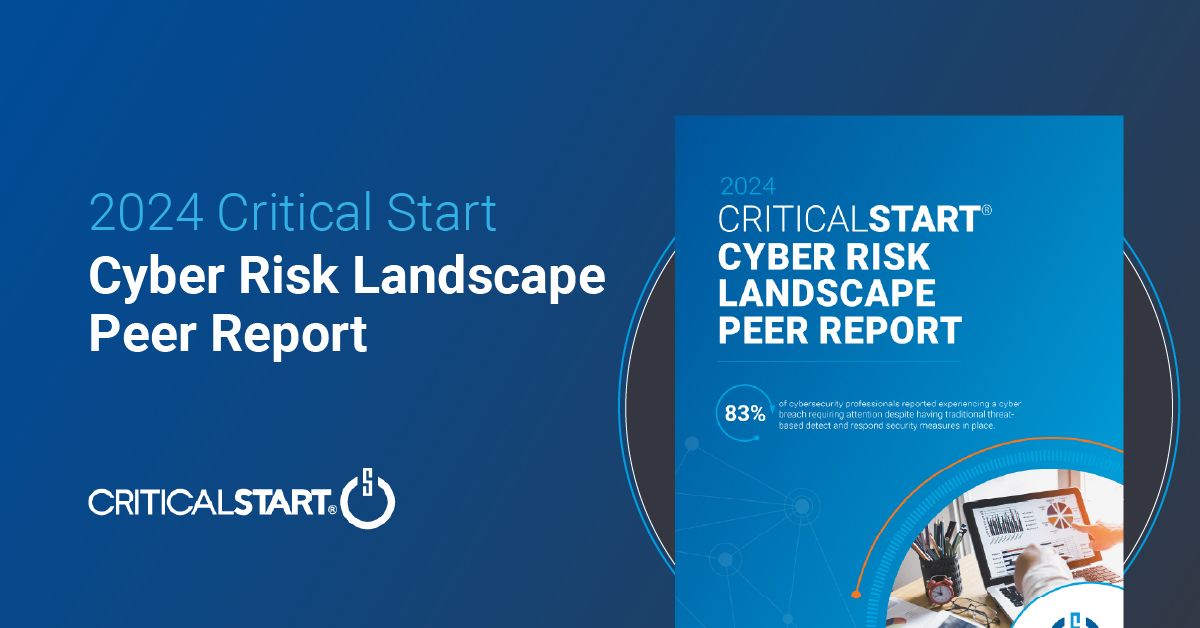Critical Start Finds 86% of Cyber Professionals’ Top Concern is Unknown Cyber Risks vs. Known Threats


Report examines market trends in cyber risk, where organizations of various sizes see their risks, and how those organizations are working to mitigate risks
PLANO, TX, August 5, 2024 – Today, Critical Start, a leader in Managed Detection and Response (MDR) cybersecurity solutions and pioneer of Managed Cyber Risk Reduction (MCRR), published its second annual Critical Start Cyber Risk Landscape Peer Report, which examines why cyber risk mitigation continues to be a challenge for organizations. The study, conducted in partnership with research consultancy, Censuswide, uncovered that 86% of respondents shared that unknown organizational cyber risks, are currently a top concern. This is an increase of 17% compared to last year signifying a need to advance proactive cyber risk management practices in addition to threat based detection and response within security programs.
Today’s increasingly complex and pervasive cyber threat landscape requires businesses to implement more robust and proactive cybersecurity measures yet concern around lack of company alignment and visibility persist. In fact, Critical Start’s report found that 66% of businesses report limited visibility and insight into their cyber risk profiles and 65% of executives expressed concerns over misalignment between cybersecurity investments and the organization’s risk reduction priorities. These findings are comparable to last year’s, 66% and 61% respectively, indicating that organization’s cyber risk management protocols haven’t improved.
“Threat detection and response is essential for organizations, as this represents the final line of defense before attacks escalate into significant breaches or cause major business disruption”, says Randy Watkins, Chief Technology Officer at Critical Start. “Based on our research, 99.4% of cyber leaders want to combine proactive security elements into their detect and response capabilities. By incorporating capabilities such as finding hidden assets, endpoint coverage gaps, and failed log ingestion, organizations can improve security operations outcomes.
The Cyber Risk Landscape Peer Report also found:
Critical Start’s report highlights the need for businesses to advance proactive cybersecurity strategies. By leveraging MDR services that integrate proactive security measures, organizations can significantly reduce their cyber risk and enhance their overall security posture. Investment in cybersecurity technology, coupled with the invaluable expertise of human analysts, is essential for navigating the complex and dynamic cyber threat landscape.
For more report findings and recommendations on implementing a proactive cyber risk mitigation strategy, download the full Cyber Risk Landscape Peer Report here.
About Critical Start
Organizations today face the challenge of optimally aligning their cyber protection measures to reduce the risk of breaches and business disruptions. CRITICALSTART® Managed Detection and Response (MDR) is the foundation to Managed Cyber Risk Reduction, which improves security operations outcomes and minimizes the probability and impact of breaches. Utilizing their Cyber Operations Risk & Response™ platform, they integrate industry-leading tools and proactive cybersecurity intelligence into the Security Operations Center (SOC) — such as comprehensive asset inventories, EDR coverage gaps, asset criticality, MITRE ATT&CK® Mitigations, and vulnerability management. Their security operations team evaluates and responds to threats, vulnerabilities, and risks, while conducting extensive threat intelligence research. Supported by a human-led risk and security operations team with over 10 years of MDR experience, Critical Start empowers businesses to protect their critical assets, demonstrating a measurable return on investment.
The platform offers maturity assessments, peer benchmarking, posture and event analytics, and robust response capabilities. This approach ensures that organizations achieve optimal cyber risk reduction for every dollar spent, enabling them to confidently reach their desired risk tolerance levels.
For more information, visit criticalstart.com. Follow Critical Start on LinkedIn, @CRITICALSTART, or on Twitter, @CRITICALSTART.
Research for the Critical Start 2024 Cyber Risk Landscape Peer Report was conducted by Censuswide via a survey of 1001 VP+ cybersecurity professionals, conducted over a specified period. The participant demographics covered a diverse range of industries, ensuring a comprehensive view of the cybersecurity landscape.
Thanks for signing up!